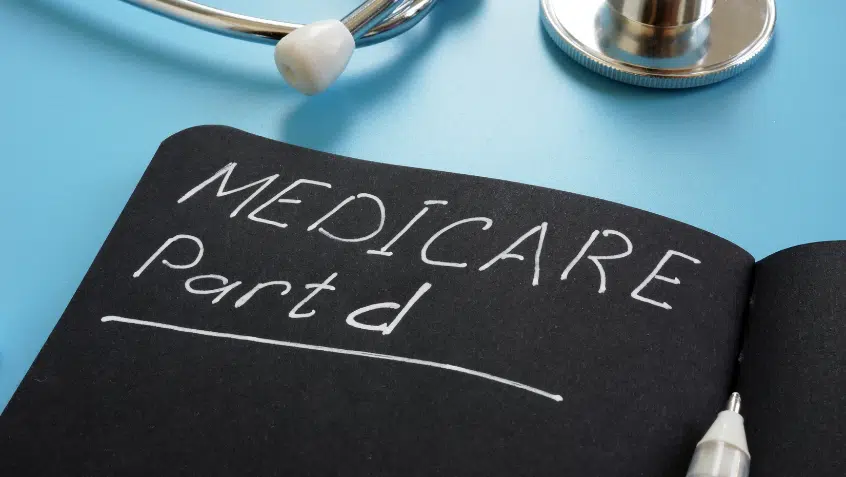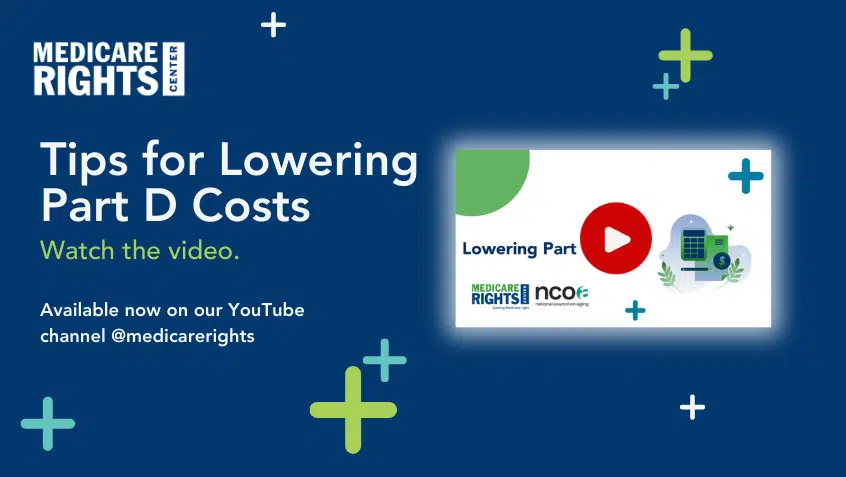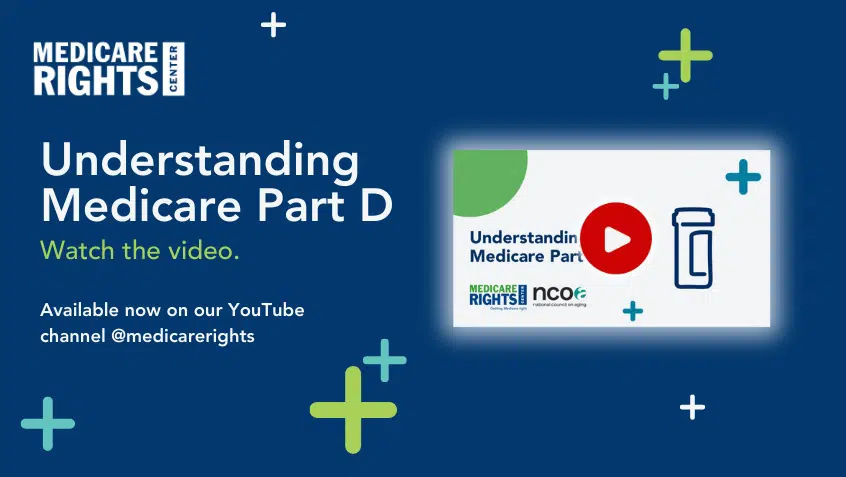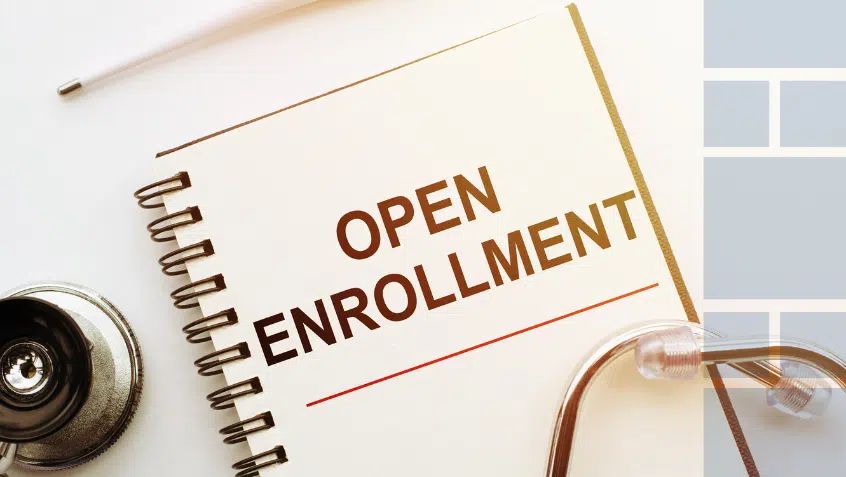Join Us Live for a Discussion on Medicare, Democracy, and the Future of Health Care
Medicare Rights Trends Report Shows Part D Enrollees Continue to Struggle with Costs and Other Barriers to Care

This third installment in our helpline trends report series examines the troubling theme of accessing and affording prescription drugs, which continues to present as a sustained issue on Medicare Rights’ helpline. In 2020-2021, 12% of all calls related to Part D access and affordability. Some of these questions were from individuals who needed financial help through Medicare’s low-income assistance programs. This includes the Part D Low Income Subsidy (LIS, or “Extra Help”), which can cover some of an enrollee’s prescription drug costs, as well as the Medicare Savings Programs (MSPs), which automatically enroll participants into LIS/Extra Help and pay for some Part A and Part B costs as well. Medicare Savings Programs (MSPs), which automatically enroll participants into LIS/Extra Help and pay for some Part A and Part B costs as well.
In our 2019 Trends report, we observed that over 40% of Medicare Rights’ helpline callers who were struggling with affordability and screened for Part D assistance did not qualify. This was due to the programs’ overly stringent eligibility rules that leave too many people without help despite being unable to afford the care they need. The pandemic has likely exacerbated this problem. Our helpline saw a pandemic-related increase in the number of individuals seeking assistance with Medicare costs, driven in part by unexpected layoffs and reductions in income.
Another subset of the Part D calls related to plan and coverage issues, such as formulary constraints, high drug tiers, and pharmacy counter denials. In many instances, the Part D appeals process was the appropriate avenue to resolve these problems. But as we discussed in the second installment of our Trends report series, successfully navigating appeals is a difficult process for many. In 2020-2021, 31% of questions on Medicare Rights’ helpline related to plan denials. Of these, 65% were about appeals, and more than one in five were on how to appeal a Part D plan’s denial of a prescription drug
Part D Improvement Opportunities
Medicare’s financial assistance programs can be a lifeline, allowing enrollees to maintain their coverage, access needed care, and afford other necessities, like food and rent. Despite these important protections, not all who need this help can get it. Absent congressional action to ease MSP and Extra Help/LIS access and address the underlying problem of high and rising drug prices, an ever-growing number of beneficiaries will find the cost of their prescriptions and other care out of reach.
Even those who can afford their medications can struggle to access them, in part due to erroneous plan denials and the unnecessarily complex rules that govern the Part D appeals and exceptions processes. For example, currently, beneficiaries may learn at the pharmacy counter that their Part D plan will not cover their medication, but not why. Pharmacists do not tend to have this information and can only direct enrollees to their plan for more detail. As a result, beneficiaries often leave the pharmacy without their medication and without knowing why it was denied.
Confused about what to do next, some may bypass the appeals process—knowingly or not—returning later to pay what they can out-of-pocket (OOP) or deciding to forgo the medication altogether. Those who do appeal must embark on a tedious fact-finding mission, winding their way through a multi-layered, burdensome system, often with little help.
Similarly, today Part D enrollees can request, through a “tiering exception,” that their plan allow them to pay less for high-cost medications when a similar, lower-cost medicine is available on the plan’s formulary but medically inappropriate for them. But this right is not available to beneficiaries whose prescription drugs are placed on the plan’s specialty tier, which has some of the most expensive medications. This frequently leads to high OOP costs. This problem is worsened by the tier’s overly permissive cost threshold, which extends eligibility to far too many drugs.
Policy Recommendations
Medicare Rights supports improving access to Medicare’s low-income assistance programs by eliminating asset limits, easing income eligibility thresholds, and modernizing onerous applications. As with hospital and medical costs, we support establishing an OOP cap in Part D. To lower costs for beneficiaries and the system, this change must be coupled with efforts to address the underlying problem of high and rising drug prices.
To reduce improper plan denials—and the likelihood that an enrollee needs to file an appeal in the first place—we recommend increased plan oversight and stronger deterrence measures.
At the same time, we recommend streamlining the appeals system for those who must use it. We suggest starting by requiring the provision of customized notices at the pharmacy counter that explain the reason for the denial (e.g., prior authorization, step therapy, quantity limits, off-formulary, non-covered) and by allowing such refusals to function as the plan’s initial coverage determination. This would empower enrollees with actionable information in real time and initiate the appeals process sooner, significantly reducing frustration and delays.
We also support giving Medicare beneficiaries the right to request tiering exceptions for specialty tier medications and raising the cost threshold so that fewer drugs are given this restrictive treatment.
These changes, simplifying Medicare appeals while fortifying beneficiary protections and lowering drug prices, would make prescription medications easier to access and afford. According to the non-partisan Congressional Budget Office, the resulting improvements in medication adherence and health outcomes would also strengthen Medicare by reducing federal spending on more costly services in the future, such as acute and hospital care paid for by Part A.
Read the report, Medicare Trends and Recommendations: An Analysis of 2020-2021 Call Data from the Medicare Rights Center’s National Helpline.
Read the first and second installments of our Helpline Trends report series.
Show Comments
We welcome thoughtful, respectful discussion on our website. To maintain a safe and constructive environment, comments that include profanity or violent, threatening language will be hidden. We may ban commentors who repeatedly cross these guidelines.
Help Us Protect & Strengthen Medicare
Donate today and make a lasting impact
More than 67 million people rely on Medicare—but many still face barriers to the care they need. With your support, we provide free, unbiased help to people navigating Medicare and work across the country with federal and state advocates to protect Medicare’s future and address the needs of those it serves.
The Latest
Most Read
Add Medicare to Your Inbox
Sign up to receive Medicare news, policy developments, and other useful updates from the Medicare Rights.
View this profile on InstagramMedicare Rights Center (@medicarerights) • Instagram photos and videos









